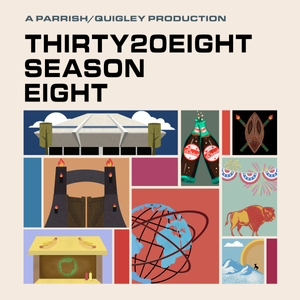
John Freed, “Frederick Barbarossa: The Prince and the Myth” (Yale UP, 2016)
07/15/16 • 69 min
For all of his importance as a medieval ruler, there are surprisingly few biographies in English of the German emperor Frederick Barbarossa (c. 1122-1190). John Freed fills this gap with his new book, Frederick Barbarossa: The Prince and the Myth (Yale University Press, 2016), which offers readers both an account of Frederick’s life and his posthumous image as a German ruler. Freed begins by describing the historical background of 12th century Germany, setting Frederick’s succession to the throne within the context of medieval dynastic politics. From there he recounts Frederick’s campaigns against both the papacy and the Italian communes, his subsequent efforts to strengthen his rule in Germany, and his death in the Near East while participating in the Third Crusade. Though an undercurrent of frustrated ambition ran throughout many of his efforts, Frederick nonetheless became a symbol of a united Germany by the 19th century and, in the process, achieved a stature as a sovereign that belied the complicated realities of the world in which he lived.
Learn more about your ad choices. Visit megaphone.fm/adchoices
Support our show by becoming a premium member! https://newbooksnetwork.supportingcast.fm/european-studies
For all of his importance as a medieval ruler, there are surprisingly few biographies in English of the German emperor Frederick Barbarossa (c. 1122-1190). John Freed fills this gap with his new book, Frederick Barbarossa: The Prince and the Myth (Yale University Press, 2016), which offers readers both an account of Frederick’s life and his posthumous image as a German ruler. Freed begins by describing the historical background of 12th century Germany, setting Frederick’s succession to the throne within the context of medieval dynastic politics. From there he recounts Frederick’s campaigns against both the papacy and the Italian communes, his subsequent efforts to strengthen his rule in Germany, and his death in the Near East while participating in the Third Crusade. Though an undercurrent of frustrated ambition ran throughout many of his efforts, Frederick nonetheless became a symbol of a united Germany by the 19th century and, in the process, achieved a stature as a sovereign that belied the complicated realities of the world in which he lived.
Learn more about your ad choices. Visit megaphone.fm/adchoices
Support our show by becoming a premium member! https://newbooksnetwork.supportingcast.fm/european-studies
Previous Episode

Vanessa Ogle, “The Global Transformation of Time: 1870-1950” (Harvard UP, 2015)
From the 1880s onward, Beirut-based calendars and almanacs were in high demand as they packaged at least four different calendars into one, including: “the reformed Gregorian calendar; the unreformed, Julian calendar used by various churches of the East; the Islamic lunar Hijri calendar; and the Ottoman ‘Rumi’ or sometimes financial/’Maliyye’ calendar.” Described as a center of calendar pluralism, Beirut’s plurality of time was less an exception than it was a quandary to later advocates who aimed to organize time along geographical lines.
In The Global Transformation of Time: 1870-1950 (Harvard University Press, 2015), Vanessa Ogle excavates 19th century movements to reform and standardize time: summer time, calendar time, time zones, religious time, and national time among others. Ogle questions the inevitability of 21st century time, demonstrating that it was the object of active creation for nearly two centuries prior. The rise of nationalism, the consolidation of colonial practice, along with autonomous religious reform movements simultaneously gave rise to, and were in turn, molded by advocacy focused on time. New communications technologies, such as the telegraph, and time-keeping devices, such as city clock towers, similarly served as the infrastructure around which time-keeping debates became organized.
Written as a historical account, time becomes a central character in this book: casting a common lens over otherwise disconnected places and people, raising controversy, and shifting between the center and the periphery of a broader story of 19th century transformation.
Anna Levy is an independent researcher and policy analyst with interests in critical political economy, historical memory, histories and philosophies of normalization, accountability politics, science and technology, and structural inequality. She is based in Brooklyn, NY and Amman, Jordan.
Learn more about your ad choices. Visit megaphone.fm/adchoices
Support our show by becoming a premium member! https://newbooksnetwork.supportingcast.fm/european-studies
Next Episode

Mitchell Yockelson, “Forty-Seven Days: How Pershing’s Warriors Came of Age to Defeat the German Army in WWI” (NAL Caliber, 2016)
In Forty-Seven Days: How Pershing’s Warriors Came of Age to Defeat the German Army in World War I (NAL Caliber, 2016), National Archives historian and forensic archivist Mitchell Yockelson reappraises the American Expeditionary Force’s performance under the command of General John J. Pershing. Accordingly, the American forces’ combat experience in the September to November 1918 Meuse-Argonne Campaign is shown to be far more pivotal to Allied victory than allowed for in the standard Anglo-centric literature of the conflict. Even as Pershing’s army acquired its craft in hard fighting against an increasingly implacable and desperate German opponent, the men of the A.E.F. proved to be relentless in their efforts to clear the densely wooded and fortified forest that had resisted French efforts for the previous four years. Yockelson’s account of the campaign is even-handed and well-written, providing the foundation for an interesting conversation about the book and his own approach to writing and interpreting history from a wide range of primary and secondary sources.
Learn more about your ad choices. Visit megaphone.fm/adchoices
Support our show by becoming a premium member! https://newbooksnetwork.supportingcast.fm/european-studies
If you like this episode you’ll love
Episode Comments
Generate a badge
Get a badge for your website that links back to this episode
<a href="https://goodpods.com/podcasts/new-books-in-western-european-studies-10993/john-freed-frederick-barbarossa-the-prince-and-the-myth-yale-up-2016-386136"> <img src="https://storage.googleapis.com/goodpods-images-bucket/badges/generic-badge-1.svg" alt="listen to john freed, “frederick barbarossa: the prince and the myth” (yale up, 2016) on goodpods" style="width: 225px" /> </a>
Copy




